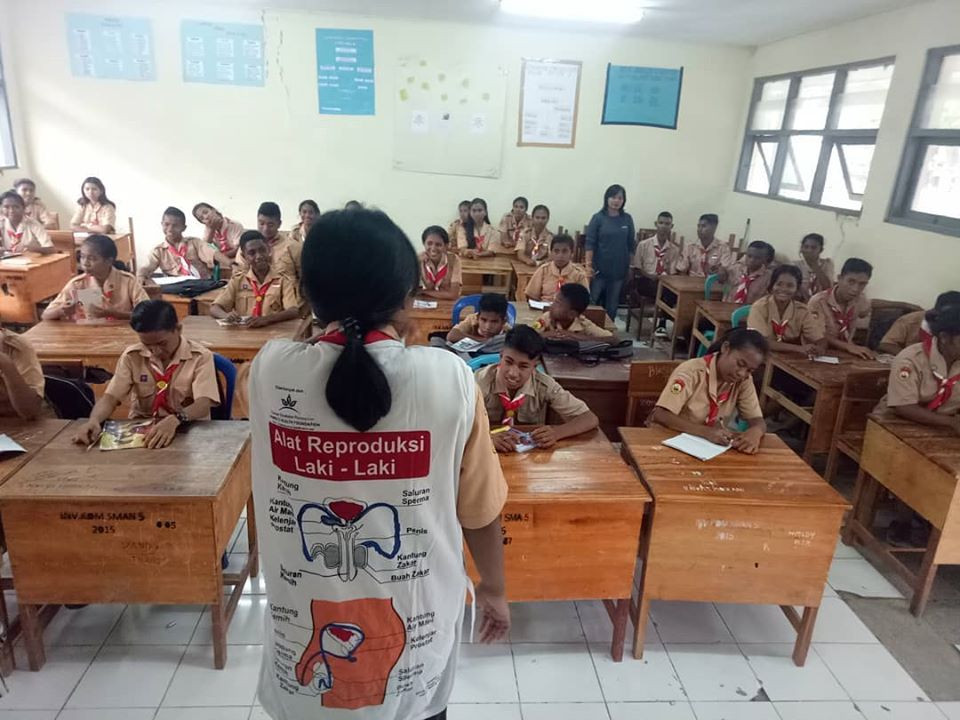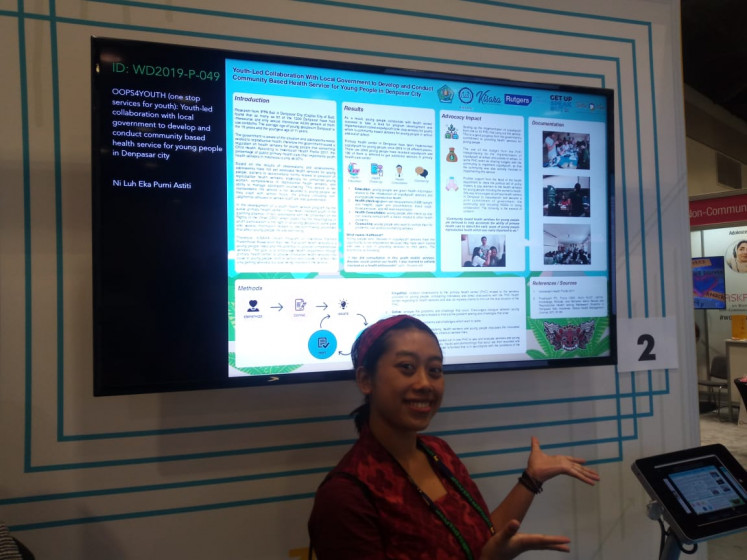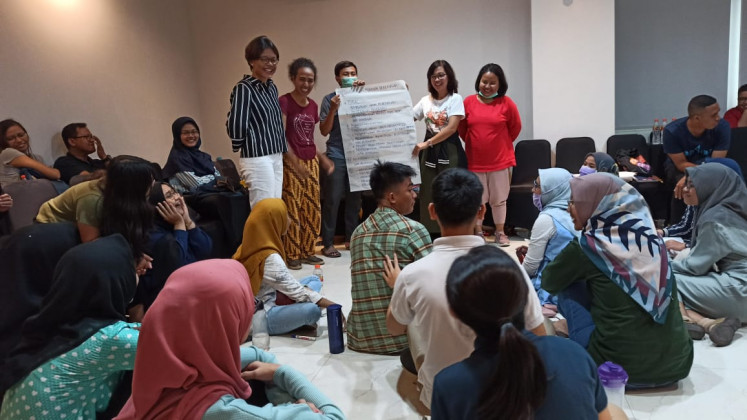Understand, love and respect your bodies
Change Size

L
span style="font-size:16px;">Living in a fast transition from rural to urban settings in Kupang has taken toll on the lives of young people in East Nusa Tenggara, one of Indonesia’s poorest provinces.
Every Saturday and especially during a full moon, dozens of teenage lovebirds flock to Liliba Bridge in Kupang, the capital of East Nusa Tenggara province.
Known for its beautiful scenery, the red concrete structure has become a popular spot for young people who call it “the Lock Bridge of Kupang,” where lovers attach their padlocks engraved with their names to its railing as a symbol of their romantic gestures and commitment.
“But, Liliba Bridge is also a symbol of ‘Broken Promise and Commitment’ and a symbol of ‘Victims of Love’,” explained Tiara Yuniarti Monddang, a leader of the Women’s March of Kupang, a youth-based organization campaigning against dating violence, gender-based violence and girls’ empowerment.

Reports revealed that many girls and boys had taken their own lives at the bridge.
“Some girls committed suicide after realizing they got pregnant and were helpless,” said Tiara. The other girls and boys took their own lives because they could not stand bullying, she added.
Theresia, a 16-year-old student at SMK1 vocational high school in Kupang, said the majority of her friends were in unhealthy relationships.
“Many students came from villages outside Kupang. So, we thought we finally found our freedom - free from rigid family rules,” Theresia said.
”When these girls fall for boys, they would do anything to win their attention and love.”
Gonxha Tabun, a student of SMA 12 state senior high school in Kupang, said many girls fell in love with motorcycle gang members.
“They are cool, although sometimes naughty,” Gonxha said.
“There are unwritten rules among that must be abide by all members of the gang. When one of the boys has a girlfriend, she ‘belongs’ to all members - a trophy lover,” added Gonxha.
Dating violence, bullying, sexual violence against both girls and boys are common among young people in East Nusa Tenggara leading to unwanted pregnancy, unsafe abortion, child marriage and even suicidal tendencies.
“Unable to speak out and to express our feelings was the key to all of our problems,” explained Linda R.Tagie, an avid activist from the Lowewini Community, a movement that aims to eliminate any form of violence against girls and women in Kupang.
“As a survivor of sexual violence, I deeply understand their feelings. We cultivate our anger, resentment, revenge as well as our helplessness, and do not know where to go or whom to speak with,” noted Linda, who is actively providing counseling for those in need.

Van Tereen, head of Kupang Health Agency, explained such problems stemmed from limited knowledge of their bodies, sexual reproductive health and rights.
“This is such an iceberg phenomenon in Kupang. Many young girls and boys alike do not have any understanding about the function of their reproductive health organs.”
Making things worse, parents, mothers in particularly, rarely give information and knowledge to their daughters, not because of their ignorance, but because they do not have any, she said.
“What is more important is to look at the mental wellbeing of these young people. Cases of depression and suicidal tendencies are increasing among the young population,” she said.
Psychologist Melania Roswita Tenie agreed that young people needed help to go through their difficult years.
“Parenting style, tradition and religious aspects have not allowed these young people to thrive in this province,” Melania said.
A grandchild of the former king of Kefamenanu, Melania is familiar with strict patriarchal family traditions.
Communication between parents and children is a one-way command in which children should abide by their parents’ rules, on how wives must follow their husbands, no matter what, she further said.
“With such a family structure, violence against women and children, girls and boys alike, has been so pervasive.”
Violent acts include physical and verbal abuses and even sexual violence.
Moreover, parents rarely talked about their responsibilities over their bodies—to literally take care of their bodies, to understand and to respect their bodies, especially their special reproductive organs.
“Talking about menstruation for girls and wet dreams for boys is a taboo conversation, while at the same time it might be the first gate to gain lessons on sexual reproductive health,” added Eliza, a doctor at the Sashi community health center (Puskesmas).
Girls and boys obtain information either from their friends or from mass media and the internet, the doctor explained. “This is concerning. Teens are curious about everything. They want to try what they see on screen.”
“Many young girls get pregnant because they do not know how to prevent unwanted pregnancy.”
Cases of unwanted pregnancies, unsafe abortions and teen marriage are on the rise without intervention from families, communities and the government.
“This has rocketed maternal mortality rates and child mortality rates in the province,” she said.
“Most young people here are trapped in a vicious cycle of violence stemming from poverty, lack of education and information, poor nutrition and strict patriarchal system,” Melania said.
According to the SDG Baseline Report on Children in Indonesia produced by the National Development Planning Board (Bappenas) and UNICEF, East Nusa Tenggara is a youthful province with 42 percent of the population or 2.2 million under 18 years old, with eight in 10 of them living in rural areas.
Some 9 percent of women aged 20-24 years were married or in union before the age of 18 in 2015, below the national average of 12 percent. Levels of child marriage are highest among girls from the poorest households.
Despite the absence of representative data on violence against girls and women in the province, evidence from a national survey indicates that such violence is widespread—an estimated 28 percent of ever-partnered women and girls experienced physical, sexual and psychological violence by a current or former intimate partner.
The community in Kefamenanu once found a dying girl in her rental room near the University of Timor. “My boyfriend refused to acknowledge that this is his baby,” Diana (not her real name) pointed to her seven-month pregnant belly.
“This is just one of many troubling incidents affecting our girls,” Melania explained adding that all parties must join hands to help young people in the province.
The writers traveled to East Nusa Tenggara and East Java provinces to explore the life of young people and to learn a variety of programs to help them thrive with supports from Aliansi Satu Visi (One Vision Alliance) as part of a book project on Indonesian youth, their dreams and challenges.









